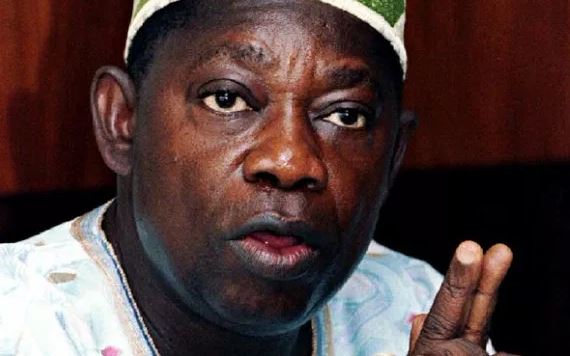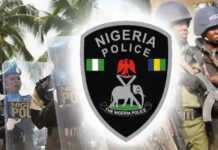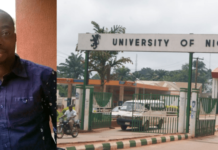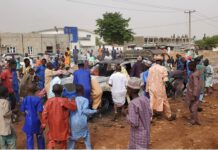
Chief Moshood Kashimawo Olawale Abiola
Today’s 25th anniversary of the annulled 1993 presidential election offers Nigerians another opportunity to reflect on the stride to representative democracy and to honour Chief Moshood Kashimawo Olawale Abiola, who symbolises a period of national history. Felix Nwaneri of the New Telegraph reports.
The clamour by most Nigerians for the Federal Government to immortalise the acclaimed winner of the June 12, 1993 presidential election, Chief Moshood Abiola, was resounding for years, but successive governments paid deaf ears to it.
The 1993 presidential poll was after a painstaking eight-year transition programme to return Nigeria to democratic rule by the then military government led by General Ibrahim Babangida. Unfortunately, the regime voided the result of the election, which would have produced his successor. That action added the word – annulment – to Nigeria’s political lexicon.
The election’s result was inconclusive before it was annulled on June 23, 1993 in a most bizarre manner. It was clear that MKO (as Abiola was popularly known) was coasting home to victory according to initial figures released by the then National Electoral Commission (NEC) before the military junta directed the electoral body to stop further announcement of results from the remaining few states.
This prompted Abiola’s insistence that he won the poll although the claim was a subject of debate for years until Prof. Humphrey Nwosu, then Chairman of NEC, set the record straight 15 years later (June 12, 2008), when he affirmed that the Ogun-State born business mogul won the election.
Nwosu, in his book titled: “Laying the Foundation for Nigeria’s Democracy: My Account of June 12, 1993 Presidential Election and its Annulment,” stated that out of the 14, 396,917 votes cast in that election, Abiola, who was the candidate of the defunct Social Democratic Party (SDP), polled 8, 323,305 votes, while his opponent, Alhaji Bashir Tofa, of the defunct National Republican Convention (NRC) had 6, 073, 612 votes.
The professor of Political Science further wrote that Tofa had one-third of votes in 23 states out of the then 30 states of the country and the Federal Capital Territory, Abuja, while Abiola had onethird of votes in 28 states, thereby satisfying the constitutional requirement to be declared winner.
Nwosu wrote: “With these results from the states, Abiola won the election,” but blamed an order by the Abuja High Court, served on NEC on June 15, 1993, for the inability of the electoral umpire to release a conclusive result of the election.
Babangida, on his part, some years ago, explained that he was compelled to nullify the poll because of security threats to the enthronement of a democratic government at the time. He pointed out that the Armed Forces Ruling Council (AFRC), which he headed then knew that Abiola if installed as president would be toppled through a military coup, which his government did not want.
While many still believe that Babangida’s reasons do not justify annulment of the election, others have continued to wonder how Abiola was able to secure his landmark victory on a Muslim/ Muslim ticket in a country, where religion plays an important role in its politics.
The fact remains that Abiola, who worked his way out of poverty through hard work symbolised the aspirations of many Nigerians then. His “Hope ‘93 manifesto,” which became a sing-song, also played a significant role. The policy paper was received with optimism by many, especially the downtrodden and the middle class.
Unfortunately, Abiola never lived to implement the progamme in which he had provided answers to pervasive poverty and dearth of infrastructure that still bogs the country till date.
The man who would have been president between 1993 and 1997, and, or beyond beyond, died on July 7, 1998, in the custody of the Federal Government four years after he was arrested and detained by the then Head of State, General Sani Abacha, for daring to declare himself president-elect. Abiola died on July 7, 1998 under suspicious circumstances shortly after the death of Abacha, the day he was due to be released.
But, events after his demise have shown that death could not becloud what he stood for as he remains in the consciousness of most Nigerians, especially pro-democracy activists, who still view June 12, 1993 as a defining moment in Nigeria’s political history.
This explains the yearly convergence to mark the anniversary of the annulled election. The annual ritual has always offered Abiola’s political associates, activists and his family to continue to insist that beyond the pockets of honour already done to the late politician, the most worthy thing for the Federal Government to do is to posthumously acknowledge him as Nigeria’s second duly elected president.
While post-1999 administrations of Chief Olusegun Obasanjo, Alhaji Umaru Yar’adua and Dr. Goodluck Jonathan failed to heed to this demand, Jonathan took a major step to immortalize Abiola, when he renamed the prestigious University of Lagos (UNILAG) to Moshood Abiola University, Lagos (MAULAG) on May 29, 2012.
The then president, in a nationwide broadcast to mark that year’s Democracy Day, said the honour was in respect of Abiola’s sacrifice in his pursuit of justice and truth. “Destiny and circumstances conspired to place upon his (Abiola) shoulders a historic burden, and he rose to the occasion with character and courage.
He deserves recognition for his martyrdom, and public-spiritedness and for being the man of history that he was,” Jonathan said. However, the gesture, which ordinarily should have earned the then president commendation, sparked-off a protest by students of the university, who trooped to the streets to reject the new name. The students, who made it clear that they had nothing against Abiola, described the name change as “provocative and unpopular.”
The university’s lecturers also condemned the name change. Beyond the students and the lecturers, most political leaders in the South- West, who were then in the opposition saw the gesture a political strategy by the then ruling Peoples Democratic Party (PDP) to break into their zone as well as playing to the gallery given the position of successive governments by the same party before then. Despite the criticisms, the Federal Government insisted on its decision to rename the university, but the protests continued. A legal suit was even instituted against the government over the name change.
These, perhaps, forced Jonathan to reverse the decision. But, a step towards the campaign to get the government to declare Abiola president received a major boost last week Wednesday, when President Muhammadu Buhari directed that the nation’s Democracy Day will, henceforth, hold on June 12 of every year as against the current arrangement, where the ceremony holds on May 29.
Buhari also announced that Abiola would be conferred with the highest national honour, Grand Commander of the Federal Republic (GCFR). Others to be honoured alongside Abiola are his running mate, Alhaji Babagana Kingibe, and late human rights activist, Chief Gani Fawehinmi, who are to the conferred with second highest national honour, Grand Commander of the Niger (GCON).
The President said of the annulled election: “June 12, 1993 was the day when Nigerians in millions expressed their democratic will in what was undisputedly the freest, fairest and most peaceful elections since our independence.”
While the investiture for the trio takes place today, it has been commendation from across board for Buhari for taking the bold step to honour Abiola. The Senate, for instance, besides extolling the decision, resolved that the Independent National Electoral Commission should declare the results of the 1993 election.
It also resolved that Buhari should declare Abiola and Kingibe as ex-president and former vice-president and should approve the entitlements due them as former president and vice-president, respectively.
While it took activists over two decades to get the Federal Government to honour Abiola, it is left to be seen if it will take same number of years to realise the demand for Abiola to be declared president given the fact that the late politician was never sworn in despite winning the 1993 presidential election.
Stay updated with the latest Nigerian news from Information Nigeria




